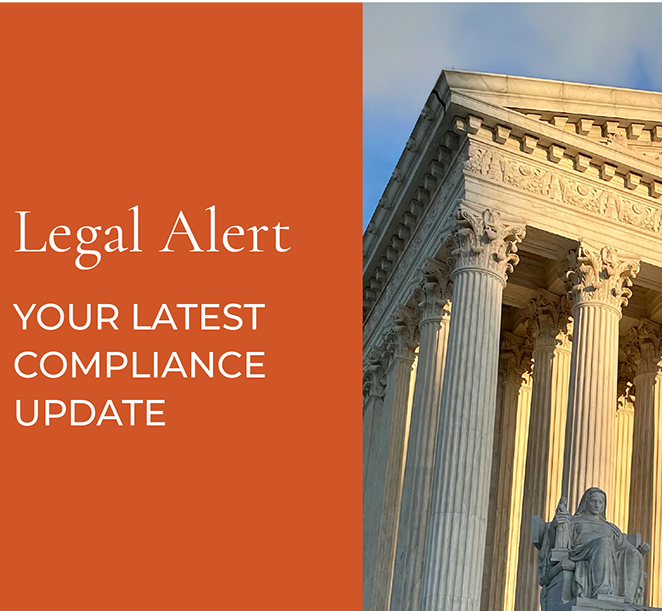Legal Alert: CMS Redesigns the Medicare Part D Prescription Drug Program Beginning in 2025
CMS Redesigns the Medicare Part D Prescription Drug Program Beginning in 2025
As a result of the changes to Medicare Part D under §11201 of the Inflation Reduction Act of 2022, on April 1, 2024, CMS released Final Redesign Program Instructions (“Final Program Instructions”) for the Medicare Part D prescription drug program, which are effective starting in 2025.
The Final Program Instructions reflect a newly defined standard Part D benefit design through several changes or enhancements to the Part D program beginning in 2025. Of those changes or enhancements, the modification most likely to significantly impact the “creditability” of many group health plans next year is the annual out-of-pocket maximum threshold, which is reduced from $8,000 in 2024 to $2,000 in 2025. Many group health plans, particularly high deductible health plans, will not be able to meet this threshold, which may result in the coverage offered by impacted employers to be non-creditable.
As explained more fully below, employers are not required to offer creditable prescription drug benefits, and there is no penalty for employers who do not. The impact is only to Medicare-eligible employees or their eligible dependents who are not offered creditable coverage and who do not enroll in Medicare Part D when they are initially eligible for benefits.
Background on Medicare Part D Requirements for Employers
Medicare Part D requirements for employers are limited to reporting obligations. Specifically, the Medicare Modernization Act (MMA) requires plan sponsors (e.g., employers) to notify Medicare-eligible participants whether their prescription drug coverage is creditable coverage, which means that the coverage is expected to pay on average as much as the standard Medicare prescription drug coverage. There are generally two disclosure requirements:
(1) Report to CMS: Group health plan sponsors must provide an annual report/disclosure of prescription drug coverage that contains certain, specified information that the group health plan submits to CMS annually (as well as at any time the plan’s prescription drug coverage terminates and/or ceases to be creditable). The annual disclosure is required to be filed electronically with CMS within 60 days after the start of each plan year; and
(2) Report to Individuals: Group health plan sponsors must also provide an annual notice to participants containing certain, specified information that indicates whether their coverage is creditable or non-creditable, which must be provided (a) before October 15 each year, (b) before the effective date of coverage for Part D eligible employees enrolling in the employer’s group health plan, (c) when/if the employer terminates prescription drug coverage, (d) if the employer’s coverage later becomes non-creditable or vice versa, and/or (e) at the request of an individual. Many employers provide the creditable coverage notice with the plan’s open enrollment materials each year to satisfy the requirements to provide the notice before the Medicare Part D annual coordinated election period and within the 12 months before any individual’s Medicare Part D Initial Enrollment Period.
As defined in the Medicare Part D regulations, coverage is considered creditable if the actuarial value of the coverage equals or exceeds the actuarial value of standard Medicare prescription drug coverage. In general, only drugs covered by Part D are taken into account in determining actuarial value.
The purpose of the individual disclosure notice is to inform Medicare beneficiaries of whether or not the employer’s drug coverage is “as good as” the Medicare Part D prescription drug coverage. This serves an important function because employees who do not enroll in Medicare during their first open enrollment period must pay a late enrollment penalty of 1% per month if they go 63 days without “creditable coverage” and then subsequently enroll in Medicare Part D. However, individuals who have creditable coverage through their employer’s health plan may opt to stay in that plan in lieu of participating in Medicare Part D. Those individuals would not be subject to late enrollment penalties.
Only employers that contract with a prescription drug plan (“PDP”) through Medicare, or that contract with Medicare to become a PDP, are exempt from this notice requirement. This means that an individual disclosure notice is required regardless of whether the employer’s coverage is primary or secondary to Medicare and regardless of whether the employer’s coverage is fully insured or self-funded.
CMS provides model notices that plans can use for disclosure to individuals.
What is Creditable Coverage?
Under the MMA, coverage is considered creditable when the actuarial value (i.e., the expected amount of paid claims) of the employer’s prescription drug coverage equals or exceeds the actuarial value of standard prescription drug coverage under Medicare Part D.
This is true regardless of whether it is the employee or the employer who pays for the coverage. If a plan has multiple benefit options, the actuarial test must be performed separately for each option.





